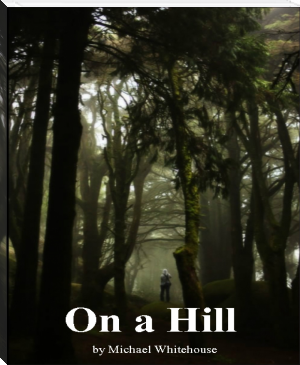Tunnels, Michael Whitehouse [tohfa e dulha read online txt] 📗

- Author: Michael Whitehouse
Book online «Tunnels, Michael Whitehouse [tohfa e dulha read online txt] 📗». Author Michael Whitehouse
The passages wound and meandered their way through the ground, long steady trajectories intermittently and abruptly interrupted by sharp blind corners which made it difficult for Henke to identify exactly where they were. There were so many winding corridors that Henke felt slightly disorientated and was ready to joke with his men that if they didn't like him as a boss that they could probably leave him there and he would never find his way out.
But his men were no longer with him.
He was standing at the mouth of a tunnel and while he had continued onwards talking, trying to fill in the difficult silences, his men had stopped at the last junction. They stood motionless some twenty feet behind, staring at Henke with blank expressions occasionally betrayed by the slightest flicker of a very real and gripping emotion beneath; a look of suppressed terror.
When he asked why the men were not following, they whispered in reply that where they stood was where the last of the repair work was needed. Pulling out a map and perusing it intently by the light of his head lamp, Henke surmised that he must have wandered into the most remote part of the sewer network, at the back of the catacombs, and while the tunnels continued into the foreboding distance this must have marked the boundary of the Rijksmuseum's foundations.
What confused him was that where he stood had been marked for repair. He was standing at the entrance to what appeared to be a rather innocuous tunnel, but on the wall next to the opening Henke could clearly see that someone had placed an identification plaque there, marking it for repair. It read 'Tunnel 72F: Water damage & failing brickwork'.
After double checking his map, it was clear to Henke that tunnel 72F was indeed still under the Rijksmuseum foundations and had to be appraised and repaired, but when he told his men this they simply informed him that where they stood was as far as they would go.
Anger began to take over, accompanied by frustration that the team he was supposed to be supervising were being so difficult, but even raising his voice and demanding that they head into the tunnel did not seem to move them. Just as things became heated and Henke began demanding that the men do as he say, Jones interjected:
"We've worked down here for two months, Henke. This is a good, hard working, talented crew you have. They will do exactly as you ask, when you ask it, but you will have to accept that for them, and me, our work stops at this junction and that none of us will go near tunnel 72F. Whether you want to believe it or not, there is something in there."
Taking a deep breath and calming himself, Henke explained to his men that he understood the stress induced by working in such an environment for an extended period of time, but that repairs in that tunnel had to be carried out. He would talk to them later about it, but for now he would carry out the survey himself.
As Henke stepped over the threshold and into the apparently forbidden tunnel, Jones and the other men protested vehemently, shouting on Henke to leave the passageway immediately, but he saw this as foolish. He was not to be swayed by unsubstantiated, superstitious nonsense. There was nothing in this tunnel to fear, and once more Henke would prove to others that they should not be so scared, by stepping up, being a man, and pushing forward into places others who are more timid in nature fear to tread. It was a point of pride for Henke, he believed in always being bold.
While the tunnel seemed fairly common in its construction at first glance, as Henke progressed deeper into the darkness it was apparent that this was unlike any sewer he had seen before. The ground was uneven; the floor dipped and rose much like some of the other tunnels, but what was peculiar was how fractured the surface felt under his feet. The ground was obscured by a thick, almost oily water which in places reached up as high as his knees. He trudged through the stagnant water slowly, not because he was scared, but simply to insure he had a sound footing. One thing was apparent, however long the water had lay there it was long enough to fester and produce an unpleasant, rotten stench.
The walls were of a different, much older composition than most of the brickwork he had seen in the sewers elsewhere. Whatever the material was which had been used, it was hundreds of years old and was obviously failing, with long penetrating cracks scarring the surface of the increasingly unstable walls and ceiling.
The light from Henke's head lamp was enough to illuminate much of the tunnel, but as he ventured further towards what he thought was a dead-end, he realised that the passageway was narrowing and that the tunnel itself did not stop there, but rather tapered slightly before curving abruptly into a blind corner.
Henke estimated that he was around 80 feet into the sewer and while his curiosity for what could be beyond that corner urged him to move forward, he believed he had made his point to his men and would now ask them to abandon their fears and enter the tunnel with him. He unholstered the black hand held radio which all the workers had been issued with from his side, and began requesting for Jones and the others to meet him at the corner of the tunnel.
No one responded, and nothing but a quiet buzz could be heard from the radio speaker. Of course Henke now remembered that he had been warned about how unreliable the radios could be, but just as he was about to turn and shout on his men, something caught his eye.
Surely not.
There was nothing in this old tunnel but stagnant water and himself! But pushing relentlessly against Henke's bravado and self assured disposition was the creeping reality that something was standing at the end of the tunnel. Obscured by the turn, Henke could only see a glimpse of it, but it was unmistakable. A ragged piece of cloth poked out from around the corner and although Henke's mind was unwilling to accept it, the cloth was obviously part of a sleeve, a sleeve which contained an arm, of who's or what's he did not know.
Disbelief.
Stubbornness can be an effective tonic for even the most horrifying and unbelievable of situations. Henke's belief in himself and his long history of triumphs over adversity welled up inside of him, filling his chest with pride, and with a strong confident stride Henke marched towards whatever was behind that corner.
The slush and slosh of the black water echoed throughout the tunnel as he made his way to that blind turn. Apprehension now turned to sadness and empathy, for standing there, shivering and dishevelled, was a girl who could not have seen more than 13 years. Her face and hands were blackened with grime and dirt hiding her pale and malnourished frame. A ripped shirt was all that she wore, hanging from her loosely with much of her body exposed to the cold of that dank, isolated place.
Gazing at him between strands of dark matted hair, Henke was struck by how beautiful the young girl was, and how afraid she must have been. At first he believed that somehow she must have made her way into the sewers and lost her way, but no matter how softly he asked her she would not answer, appearing afraid and nervous.
Henke tried his radio again, but was greeted with the same meaningless static. Regardless, he had to get her out of that tunnel, back through the sewers and into the Rijksmuseum and seen by a doctor. He did not want to shout on his men as it may have added to the girl's disquiet, so he decided to lead her out of the passage himself. As he approached, Henke spoke gently to the girl explaining that he would take her up above to safety. She seemed terrified of him, and this made Henke feel uncomfortable as he prided himself on being someone who would do anything to protect the vulnerable, and not at all someone to be feared.
She made no sound, but as Henke neared she raised her hand, pointing one finger at the light on his helmet. He suddenly realised that the light must have been frightening her somehow, so he merely took the lamp off and held it in his hand, the torch now illuminating the girl's shirt more starkly. The changed angle of light brought something unsettling to Henke's attention. Pinned to the shirt was a yellow cloth star. It surprised him as it was entirely familiar but it took a moment for his mind to grasp the memory; it was exactly like the yellow stars forced upon the Jewish populations during their persecution, to allow non-Jews and members of the Nazi regime to identify them.
Henke's mind fought against the ramifications of such a discovery. After a momentary pause, he once again was resolute, disregarding the cloth star and asserting to himself that he must take this poor girl out of such horrible surroundings.
A tremendous sense of sadness overcame Henke as he grew closer. The torch flickered unusually in his hand as he looked down at the girl, her face momentarily illuminated by the shifting light, as he prepared to carry her out of the sewers if need be. But this sense of duty, this compulsion to be brave and assertive in even the darkest of places, was now replaced with something which Henke had never felt before. Up his spine and from the very pit of his stomach fear gripped him, terror took him, and a horror so potent made him feel anxious, weak, and unsteady.
For Henke had not noticed something so subtle, yet essential to his predicament. The girl had not stopped pointing at him as he drew closer. Her arm was ridged and her finger remained outstretched, even the light which was now in his hand seemed entirely unimportant to her. Realisation swept over him like a plague of abject dread.
The girl was not pointing at the light, she was pointing behind him.
Henke did not remember much more of what happened in that tunnel, but he knew that he had indeed turned to face whatever was standing there. He thanked God (not something he was normally inclined to do) that Jones and those men who feared that dark hollow so acutely, had dispensed with this fear and ran into the passageway as soon as they heard his screams.
Henke regained his composure back at the alcove where he had met the men, but he immediately pleaded with them that they take him back out of the tunnels, which is what they did. Once back in the elevator room of the Rijksmuseum, the men sat and had a frank discussion with Henke about what had been happening down there over the past few months. Jones explained that the first survey team which had encountered that specific sewer passageway resigned from their posts after just one night down there. A week later one of their co-workers who decided to stay on, committed suicide after complaining to everyone that he could hear whispers coming from that tunnel while he worked





Comments (0)